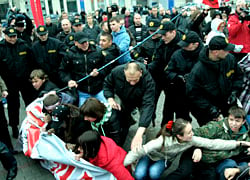Amnesty International: Freedom of speech and civil activists persecuted in Belarus
2- 28.05.2009, 14:21

The annual report of the international human rights organisation Amnesty International says that the situation with human rights in Belarus hasn’t changed: peaceful rallies are brutally disbanded, civil society activists and journalists were harassed.
“The government continued to exert excessive control over civil society. State control over the media increased,” AI experts noted.
“Some public events were banned; peaceful demonstrators were fined and detained for short periods; and civil society activists and journalists were harassed. Belarus continued to hand down death sentences and execute prisoners,” the report of the human rights organisation reads.
It is mentioned in the report that the OSCE had sent an observation mission to the parliamentary elections held on 28 September and found they fell short of OSCE standards.
“There were some improvements in access to the media for opposition candidates but the mission found that voters still could not make an informed choice. Article 193-1 of the criminal code continued to restrict rights to freedom of assembly and expression,” human rights watchdogs state.
“There were signs of increased engagement with the EU. Following the release of a number of opposition prisoners in the course of the year, on 13 October the EU temporarily and partially lifted the travel ban that had been imposed on some leading government figures in 2006,” the report reads.
Among violation of freedom of assembly in Belarus, authors of the report name “banning or using force to disperse demonstrations, detaining peaceful demonstrators, and harassing civil society activists and journalists.”
Human rights activists have also noted violation of freedom of expression as a result of a new law on mass media signed by Alyaksandr Lukashenka. The law “he new law would considerably increase restrictions on freedom of expression and make it even more difficult for media outlets and journalists to work.”
“The new law further increased restrictions on registration, forbade any funding from abroad or from unacknowledged sources, and made it easier for state organs to close down media without a court order and with only one warning. The law applied to internet publications, and … it would apply to websites because of the need to control “disinformation from foreign sites,” the report says.









